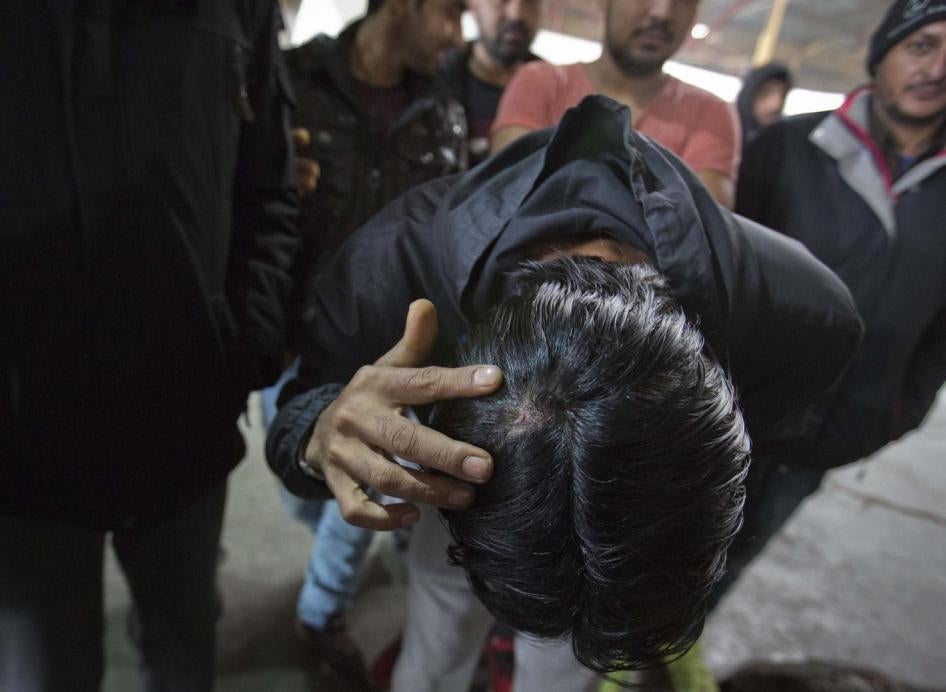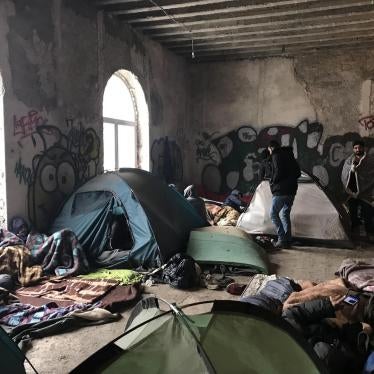(London) – Croatia should immediately stop summarily returning migrants and asylum seekers to Bosnia and Herzegovina, in some cases with force, Human Rights Watch said today in an open letter to President Kolinda Grabar-Kitarovic. The president’s recent admission during an interview on Swiss television that Croatian officials are engaged in these pushbacks triggers a responsibility by Croatian authorities to investigate and to hold those responsible for any unlawful action to account.
Human Rights Watch and other nongovernmental and intergovernmental organizations, including the United Nations High Commissioner for Refugees (UNHCR) and Council of Europe (COE), have regularly reported on and raised concerns about pushbacks and violence by Croatian border officials at Croatia’s border with Bosnia and Herzegovina. Croatian authorities had denied the allegations, in some cases with smears of the groups and victims.
“Zagreb needs to put an end to unlawful pushbacks and violence against migrants at its borders,” said Lydia Gall, senior researcher for Balkans and the Eastern European Union (EU) at Human Rights Watch. “Croatian border officials have mistreated hundreds, perhaps thousands, of migrants and asylum seekers, who deserve redress and justice.”
Human Rights Watch found in a December 2018 report that Croatian border officials apprehend migrants far inside Croatian territory, and without due process push them back into Bosnia and Herzegovina. In some cases, they use force, pummeling people with fists, kicking them, and making people cross freezing streams, and run gauntlets between police officers. Violence is directed against women and children in some cases.
The government denied all allegations of summary returns and violence. In a separate May 20 meeting with the Interior Ministry, the state secretary said that the people Human Rights Watch interviewed had fabricated their accounts and accused activists of impersonating Croatian police officers to make them look bad.
As a result of the 2016 border closures on the Western Balkan route, thousands of asylum seekers were stranded, the majority in Serbia, and found new routes toward the EU. In 2018, migrant and asylum seeker arrivals increased in Bosnia and Herzegovina, from fewer than 1,000 in 2017 to approximately 22,400, according to the European Commission. The Commission estimates that 6,000 migrants and asylum seekers are currently in the country. Bosnia and Herzegovina has granted international protection to only 17 people since 2008. In 2017, 381 people applied for asylum there.
The summary return of asylum seekers without consideration of their protection needs is contrary to EU asylum law, the EU Charter of Fundamental Rights, and the 1951 Refugee Convention.
Since July 2018, the European Coast Guard and Border Agency, commonly known as Frontex, has had a presence on the Croatia and Bosnia and Herzegovina border through a Multipurpose Aerial Surveillance (MAS) system, meaning daily aerial patrols along the border and border area to detect irregularities. One of the priorities of the Frontex operation is to detect human rights violations and summary returns.
But in late May, Frontex told Human Rights Watch that it had not detected any human rights violations or pushbacks. The Croatian president’s statement calls into question the effectiveness of Frontex’s mission and the extent to which it is capable of fulfilling its mandate to protect human rights while engaged in border control efforts, Human Rights Watch said.
The Croatian president and the government should immediately take necessary steps to comply fully with international and EU law. The EU should review the Frontex border operation to ensure compliance with EU laws and fundamental rights. The European Commission should call on Croatia, an EU member state, to halt and investigate summary returns of asylum seekers to Bosnia and Herzegovina and allegations of violence against asylum seekers. The Commission should also initiate legal enforcement action against Croatia for violating EU laws, Human Rights Watch said.
“The denial of Croatia’s abusive border policies by Zagreb and EU institutions is no longer tenable,” Gall said. “The European Commission needs to protect EU law and fundamental rights at external borders by opening infringement proceedings against Croatia and calling on authorities to investigate alleged abuse and provide fair and efficient access to asylum.”








